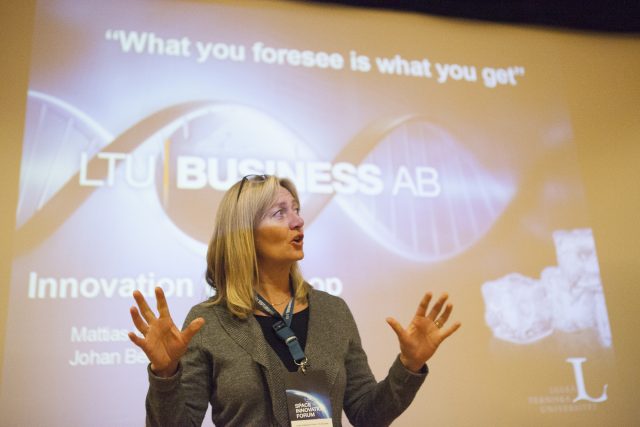The Space Innovation Forum is quickly becoming the meeting place for the aerospace industry and academia in northern Sweden. During two days the members discussed aerospace innovation both upstream and downstream, entrepreneurship and idea generation in the industry and a future agenda for the aerospace industry in northern Sweden.
– The Space Innovation Forum aims to develop an attractive and creative environment for the space industry and for regional SMEs interested in getting involved in the space sector. Creative meeting points like this can attract people, investors and businesses to the region and in the long run stimulate regional growth, said Johanna Bergström-Roos, business developer at LTU Business AB.
Since the last Space Innovation Forum, two additional regional SMEs has started new collaboration projects with the space sector, thanks to this project. This is very promising as regional SMEs are one of the most important target groups in the RIT project
The two days of Space Innovation Forum included updates on the three work packages of the RIT project as the creation of a new Centre of Excellence, the innovation ecosystem around the space sector and ongoing R&D projects.
The keynote speaker was Stefan Gustafsson from the European Space Agency, who spoke about the importance of recycling business ideas and he brought up examples of how it is possible to find techniques and models from other sectors that can be implemented in the space industry, or vice versa.
– ESA’s incubator system currently has a survival rate of 87 percent from their incubator companies. That is a very high rate. Too high some people say, so we must become better at taking calculated risks to achieve real, exciting and innovative ideas, said Stefan Gustafsson, Technology Transfer Officer at the European Space Agency.
Anna Rathsman from SSC Esrange spoke briefly about the importance of establish a service to launch small satellites into space from Kiruna.
– It is extremely important that the Swedish government will recommend and work towards an implementation on this service. It is an important next step in strengthening Kiruna as a World Class European Space Centre, says Anna Rathsman from SSC Esrange.
The forum ended with a fore sighting workshop led by Johan Bergström and Mattias Bergström, business developers at LTU Business AB. The participants worked on identifying common denominators, creation of interesting ideas and how to move them forward.
– The workshop is tailor made for the project objectives, to increase cooperation between academia/industry and to build an innovation ecosystem for the aerospace industry. We help participants to realize their ideas about future research and development projects as well as possible areas of innovation, said Johan Bergström.
– ESA’s incubator system currently has a survival rate of 87 percent from their incubator companies. That is a very high rate. Too high, we must become better at taking calculated risks to achieve real and exciting and innovative ideas, said Stefan Gustafsson, Technology Transfer Officer at the European Space Agency.
Anna Rathsman from SSC Esrange spoke briefly about the good news from the Swedish National Space investigator Jan Nygren and his final positive assessment to establish a platform to push up the mini-satellites from Kiruna.
– It is extremely important that the Swedish governemnt says yes and recommends this platform. We’re not there yet, but it is an important first step in establishing Kiruna as a European leader spaceport, says Anna Rathsman from SSC Esrange.
Two new companies also started new research projects in the RIT-project. Conex Engineering and N66 will now begin to work with so-called innovation graduate students.
The forum ended with internal foresighting workshop with business developers Johan Bergström and Mattias Bergström from LTU Business AB. The participants got together to visualize a concrete vision for the future of the space industry and how best to get there.
– The workshop contributes to the project objectives, to increase cooperation between academia and industry to build an innovation system for the aerospace industry. We help participants to realize their ideas about future research and development projects as well as possible areas of innovation, said Johan Bergström.

